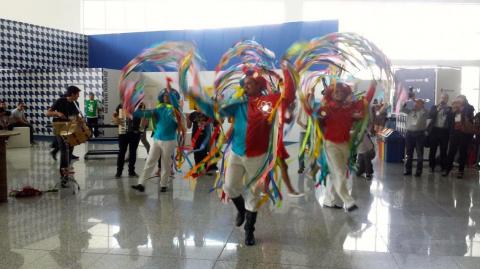
Stakeholders at the 10th annual meeting of the Internet Governance Forum, IGF 2015, expressed strong support for public access to the internet through libraries to achieve the goal of universal connectivity.
Over 2,400 delegates attended conference, which took place in the Poeta Ronaldo Cunha Lima Convention Centre in João Pessoa, Brazil, from 10-13 November. Another 4,000 people from 116 developed and developing countries took part online.
The IGF 2015 theme was ‘Evolution of Internet Governance: Empowering Sustainable Development’, and debates addressed the challenge of increasing access to information, and opportunities presented by the internet for achievement of the United Nations 2030 Agenda for Sustainable Development.
Goal 9 of the 2030 Agenda agenda sets an ambitious target to ‘significantly increase access to information and communications technology and strive to provide universal and affordable access to the Internet in least developed countries by 2020.’
SUPPORT FOR LIBRARIES
Broad support for libraries as centres for public internet access emerged during a main session of the IGF, open to all IGF Dynamic Coalitions. This was the first time that IGF Dynamic Coalitions - informal issue-specific groups - were given the opportunity to showcase their work to the mainstream of the IGF annual meeting, formally, during a main session.
The main session was attended by delegates from international and national government agencies, civil society, business and the technology sector.
The Dynamic Coalition on Public Access in Libraries (DC-PAL) established in 2011 by EIFL and IFLA (the International Federation of Library Associations and Institutions) tabled a report of its work and a statement of key principles on public access to the internet through libraries for multi-stakeholder discussion.
Delegates’ responses to the ideas presented by DC-PAL were overwhelmingly positive.
KEY PRINCIPLES ON PUBLIC ACCESS IN LIBRARIES
The DC-PAL paper states key principles on public access in libraries, as follows:
- Libraries should be recognized as an existing vehicle for ensuring universal internet access and be used when available to initiate infrastructure and connectivity for all.
- Governments should provide an enabling environment for universal access to information by providing policy and legislation (including allocation of funds where needed) to support the role of libraries in providing public access to ICTs, internet connectivity, related training and access to information and knowledge so that all people can participate fully in society.
- Libraries should be supported in their role of offering training and skills development for technology, information and media literacy to all.
- Individuals have the right to privacy when they seek information; internet users in libraries must not be subject to surveillance of their activities.
- Libraries should be supported in enabling the creation of local content and in promoting and providing online access to local, government and open access content.
Click here to read the full DC-PAL Statement of Principles.
Delegates at the session also discussed the need to look for links between different DCs in order to take forward the IGF’s overarching goals universal connectivity for sustainable development. They proposed that inclusion of DCs in the main session of the IGF should become a permanent feature of future annual meetings.
Dynamic coalition on public libraries meeting
Before the main session, the DC-PAL met to discuss progress and refine the Statement of Principles later tabled at the main session.
The session was led by IFLA Manager (Policy and Advocacy), Christina de Castell, with IFLA Director, Stuart Hamilton, and EIFL Public Library Innovation Programme (EIFL-PLIP) manager, Ramune Petuchovaite, giving input on key issues relating to the ways in which libraries are supporting community development, and their potential to expand their role.
The DC-PAL meeting focused on the need to continue to raise national awareness about libraries’ role in providing access to information, both offline and online, especially within the context of the United Nations 2030 Agenda for Sustainable Development.
Delegates discussed the need for policy makers and donor agencies to prioritize existing community spaces, such as libraries, when planning internet roll-out and developing grant-making programmes, the need to increase access to knowledge and information by creating locally relevant content in local languages, and the need to build capacity of library workers to support community technology, media and information literacy needs.
Background
EIFL and IFLA are founder members of the Dynamic Coalition on Public Access in Libraries (DC-PAL), which was formed at the 2011 annual meeting of the IGF. DC-PAL aims to engage the IGF community in discussion about public access to the internet and the role and potential of libraries.
The Internet Governance Forum (IGF) is a multi-stakeholder platform that brings together representatives of international and national government bodies; non-governmental agencies, and the philanthropic, business and technology sectors to discuss public policy issues relating to the internet.
SHARE / PRINT










